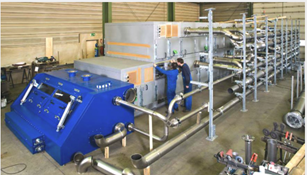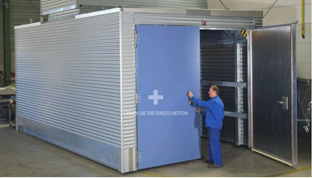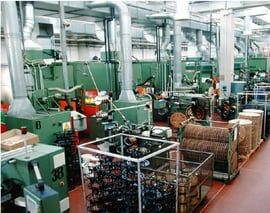Bernd Münstermann GmbH from Telgte, Germany, is a family-run company specializing in special plant engineering with a product focus on drying plants. As a leading full-range supplier of drying and heat treatment plants, including the associated conveying and filter technology, the company has its own MSR as well as assembly department. From planning to commissioning Münstermann offers worldwide service from one source.

Microsoft Dynamics NAV had long been used as the company's ERP, but project and resource planning was done outside the system using various Excel spreadsheets that were not integrated with each other. Over time, it became clear that this approach was very error-prone and that a planning tool would be necessary. On the one hand, this tool had to combine the information from the different "isolated applications" and, on the other hand, ideally it had to be integrated directly into the ERP system.
After a thorough review, the choice fell on NETRONIC's Visual Jobs Scheduler (VJS).
This led to

The extensive range of services offered - from planning of the machines to commissioning - poses complex challenges for project and resource planning at Münstermann. Not only the production has to be planned, but also the deployment of the assembly workers and the sometimes long occupancy of the hall spaces during the production of a new plant.
Before the VJS was used at Münstermann, planning ran with the help of several different Excel spreadsheets, which, according to Markus Wendeler, IT manager at Münstermann, "were rudimentarily linked to each other." For example, there was a table for production reports and one for design, which were merged into a project control file. Another table, the planning list, took the individual plans from the other tables.
Coordination between the departments took place at intervals of one to two weeks. According to Wendeler, "the time required to populate the tables was kept within reasonable limits," but the problem was rather that "the data often did not match. Therefore, the results were not accurate and not well usable. This led to inconsistencies and scheduling difficulties."
In addition, this approach also did not provide an accurate overview of resource utilization in the individual departments, which is of course essential for reliable project planning.
Münstermann wanted a project and resource planning tool that was
completely integrated into NAV in order to process all data centrally in one coherent system, so that subsequently
errors during transfer are avoided
access to other data available in NAV, such as absence times, is made possible
a transparent and reliable overview of the utilization of resources is gained
deadlines are reliably met
is easy and understandable to use and provides for quick planning
allows individual extensions in an uncomplicated way
The newly created work preparation department had the task to renew the planning system in the company. While searching for a tool with the above mentioned features, they came across NETRONIC's Visual Jobs Scheduler in the Dynamics NAV environment.
In addition to the standard functions of the planning tool, Münstermann needed individual functionalities, e.g. for the graphical planning of the hall occupancy. According to Wendeler, NETRONIC implemented these functions immediately and without complications.
All employees involved in planning now have access to the VJS, which visualizes the data from Dynamics NAV in a clear graphical representation and enables simple (re)planning via drag & drop. This applies to both the scheduling of projects and concrete resource planning.
The complete integration in NAV also offers, according to Wendeler, "access to time management data, such as absenteeism", which is also stored in NAV and is of course also displayed in the VJS. The central maintenance of the data prevents transmission errors from the past and makes the planning data more reliable.
Maintenance of all data in one system
For Markus Wendeler, the main advantage of the VJS is clearly that there is now "central planning with one tool that everyone can access, transmission errors are avoided, and thus the data becomes more binding."
Overview of resource utilization
The newly gained transparency also means that "we have an overview of the resource utilization of the individual departments," another basic requirement for smooth project planning.
Avoiding bottlenecks
The overview of resource utilization also makes impending overloads immediately visible: "This means you can take direct countermeasures, for example by buying in personnel and using temporary workers. Thus, you're also prepared for unforeseen situations."
Improved adherence to deadlines
Of course, stable planning with reliable data also means that deadlines can be better planned and met.
According to Wendeler, other companies in a comparable environment and with similar planning requirements can definitely benefit from the use of a graphical planning board: "In any case, we can recommend the tool and the company. The cooperation worked out great!"
Wendeler on the use of the VJS and the cooperation with NETRONIC:
"The cooperation was very good, especially the uncomplicated and direct contact to the developers was very helpful for us, as we needed various adjustments for our individual processes. These were all integrated quickly and well into the VJS."
Customer: Inarca SpA
Summary: The Visual Jobs Scheduler brings transparency to planning, ensuring smooth and timely project execution.
